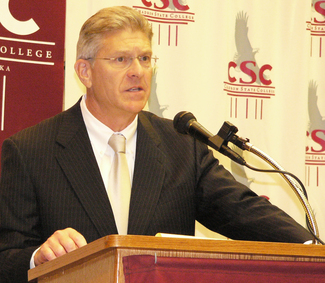Government careful not to abuse Patriot Act, speaker says

The Patriot Act provided tools to help law enforcement agencies investigate and prosecute terrorist activities, but most of those tools were already available, the U.S. attorney for Nebraska said last Friday at Chadron State College.
Mike Heavican told approximately 100 persons attending a special Constitution Day program at CSC that some criticize the Patriot Act for being passed too hastily following the deaths and destruction of Sept. 11, 2001.
However, Heavican said the government has been careful while using the powers laid out in the law and so far the American Civil Liberties Union, which opposes portions of the act, has not found that any abuses have occurred.
Heavican said international terrorism is the No. 1 threat to the United States. He added that protecting against terrorism is his office’s primary responsibility, even though it does not take the most time. He said prosecuting criminal cases, most of them related to drugs, is the most time-consuming activity confronting his office, which is located in Omaha and employs about 25 lawyers.
“We’re not likely to find a lot of international terrorists in the Midwest, but we want to be prepared,” he commented.
Heavican defended what he called “the two most controversial” portions of the Patriot Act, They are sections 213 and 215.
He said critics charge that Section 213 violates the Fourth Amendment to the Constitution pertaining to search and seizure. It is sometimes referred to as “sneak and peak” because it allows law enforcement authorities to obtain search warrants from a federal district judge to search homes, offices and vehicles and delay notifying the suspect that the search has occurred.
Heavican said the federal government already had the power to delay notification when it used wire tapping as a means of obtaining information. He called wire taps “another form of search warrants,” and added that this procedure has been used in less than one-half of one percent of the cases the government investigates.
Provision 215 expanded the government’s ability to obtain records to be used in its investigations. Heavican said the records are usually obtained from motels, telephone companies or financial institutions.
He said investigators could previously get these records through grand jury subpoenas, but now they may be obtained quicker by going to one of about a dozen federal district court judges and showing probable cause. Only senior members of the FBI can ask for the records, and they must certify that the information being sought pertains to international terrorism, the speaker said.
“This is not an expansion of government powers,” Heavican said. “Various federal courts around the United States prior to the Patriot Act had, in fact, said it was okay to give delayed notification. The Patriot Act codified this so we have a uniform set of rules to follow.”
Heavican said this provision is an extremely useful tool in combating terrorism. The controversy, he said, is in how long the delayed notification can be. He said it is now open-ended, but the government usually notifies the party being investigated within seven days. It is anticipated that congress will put more specific time lines in the law the next time it is revised, Heavican stated.
“The federal government has been very careful not to overuse these provisions,” he stated. ”We want to make sure that the citizens of the United States know we are going to protect them from criminals and terrorists, but we always want to make sure that we don’t violate the provisions of the United States Constitution.”
He added that Provision 215 cannot be used to investigate an American citizen.
In another matter, Heavican said methamphetamine is “extremely addictive and
has horrible consequences”. He said that while 95 percent of the meth found in Nebraska comes from Mexico or the southwestern United States, the “mom and pop” laboratories where the remaining 5 percent is manufactured are extremely volatile and have the potential to do great harm.
He said he is not sure how many of the labs exist in Nebraska, but believes they have declined in the Lincoln and Omaha areas. He commended the Nebraska Legislature for making it more difficult to purchase one of the key ingredients, pseudoephedrine, that is found in cold tablets. The tablets must now be placed behind the counter or in a locked container and an ID card is needed to make the purchase.
Category: Campus News
